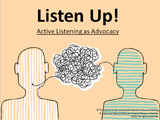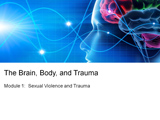 (30 Mins)Through interactive scenarios and discussion this course will introduce you to the key principles and various active listening skills we can use to enhance the ways in which we connect with and serve survivors of sexual violence. The course also offers additional handouts with scenarios and exercises for practicing our active listening skills.
(30 Mins)Through interactive scenarios and discussion this course will introduce you to the key principles and various active listening skills we can use to enhance the ways in which we connect with and serve survivors of sexual violence. The course also offers additional handouts with scenarios and exercises for practicing our active listening skills.
 (1 hour each webinar) This series of recorded webinars explores trauma-informed
storytelling methods, how to be trauma sensitive when working with personal stories,
ethical practice in working with personal stories, and creative ways to
position stories as tools for social change.
(1 hour each webinar) This series of recorded webinars explores trauma-informed
storytelling methods, how to be trauma sensitive when working with personal stories,
ethical practice in working with personal stories, and creative ways to
position stories as tools for social change.
 (1.5 Hours) Professionals who work in the school setting are in a unique position to help lessen the effects of trauma students experience. This course series will help teachers and other school based professionals gain a better understanding of child sexual abuse (CSA) and their role in supporting children who have experienced it by incorporating trauma informed practices in the classroom.
(1.5 Hours) Professionals who work in the school setting are in a unique position to help lessen the effects of trauma students experience. This course series will help teachers and other school based professionals gain a better understanding of child sexual abuse (CSA) and their role in supporting children who have experienced it by incorporating trauma informed practices in the classroom.
 (~30 Minutes) How we communicate with a person who has experienced sexual
violence can impact how they recover and begin to heal. Mirroring language,
allowing silences, and not naming a survivor’s experience are key techniques to
trauma informed service provision. This introduction offers some ways to approach working with
survivors across the lifespan through a trauma-informed lens.
(~30 Minutes) How we communicate with a person who has experienced sexual
violence can impact how they recover and begin to heal. Mirroring language,
allowing silences, and not naming a survivor’s experience are key techniques to
trauma informed service provision. This introduction offers some ways to approach working with
survivors across the lifespan through a trauma-informed lens.
 (2.5 hours) This course provides an overview of the neurobiological and
psychological implications of sexual assault, abuse, and
harassment, and the information and skills necessary for victim service
providers to provide trauma-informed services.
(2.5 hours) This course provides an overview of the neurobiological and
psychological implications of sexual assault, abuse, and
harassment, and the information and skills necessary for victim service
providers to provide trauma-informed services.